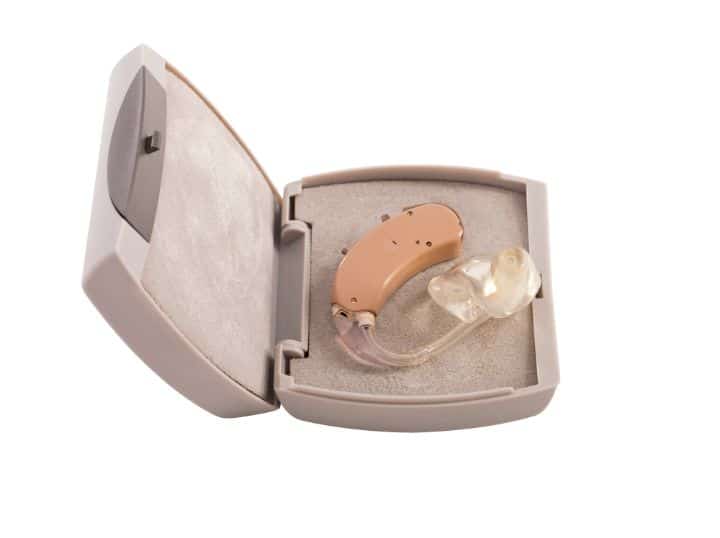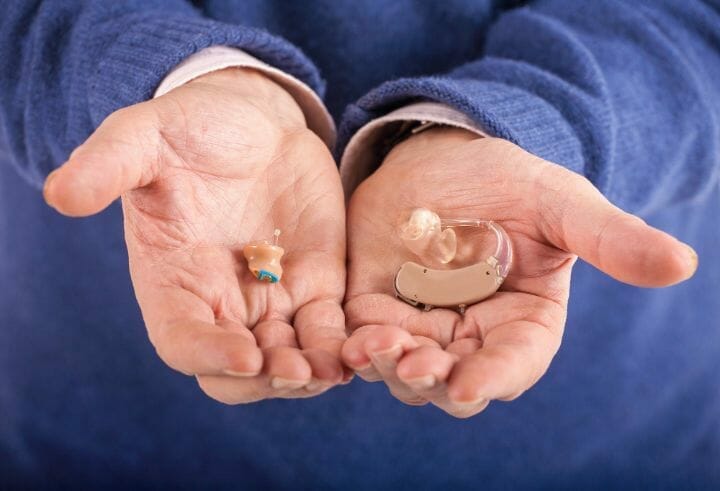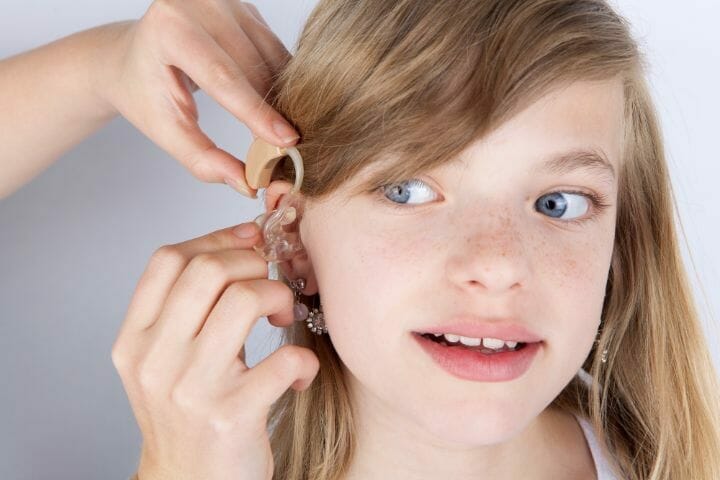When it comes to hearing loss, hearing aids can make a huge difference in anyone’s life. Whether you or your loved one, have upgraded to cochlear implants or perhaps, unfortunately, your loved one has passed away donating hearing aids is a great idea.
There are a lot of people who are living with hearing loss that cannot afford to purchase new hearing aids, or may need different ones they just can’t buy.
What’s great is that there’s a number of organizations in who work within various communities to gather donated hearing aids and help distribute them to those who are in need.
Contents
Why Choose Hearing Aids?
While there are accommodations to help those with hearing loss – like sign language – it’s important that those who are living with this do their best to address the issue as soon as possible.
Neglected hearing loss can lead to a variety of other health issues like cognitive impairment and even an increased risk for falling. Healthy hearing is imperative to your overall wellbeing, so wearing hearing aids can help to prevent or even reverse these health issues and keep you healthy for many years to come.
How Much Do Hearing Aids Cost?
Every person’s needs are going to be a little bit different so there isn’t a flat fee for everyone. It is estimated that hearing lost can cost families upwards of $10,000 each year in accommodations.
With hearing aids, though, these costs can be cut approximately in half. Many families – especially those with young children – cannot afford $10,000+ every year.
For those individuals who have hearing loss but are not financially well off, donating hearing aids and other assistive devices can really help them in their every day life.
You may also like Best Headphones For Autistic Children And Adults
Will Used Hearing Aids Work for Other People?
In some cases, hearing aids are custom fit to the person who purchased them, but that isn’t the case for everyone. Many people’s hearing aids will work for others, depending on the kind and fit that they are.
There are basically two styles to hearing aids: ITE, or in the ear, and BTW, behind the ear. The way these hearing aids fit is quite different from each other so here’s what you need to know about each before donating them.
1. In the Ear Fit
This style of hearing aids is less likely to fit anyone else very well as they are typically custom fit to the owner, and are made to fit precisely into that person’s ear canal.
The shape of each person’s ear canal is unique to them, so this style cannot usually be donated or recycled for use by anyone else unless the custom shell on it is remade.
Changing out the custom shell may not even be possible depending on the make of the hearing air, or it could even be more expensive than purchasing a new hearing aid for someone.
2. Behind the Ear Fit
This style of hearing aid is much more flexible and likely to fit others if you want to donate it. These hearing aids fit to the ears with either custom ear molds or ear domes.
The ear molds cannot be used by anyone else – most likely – but the hearing aid device itself can be used by other people. The device can be reprogrammed by a practitioner to fit the new owner’s hearing needs.
The new owner would only need to pair the hearing aids to their own custom fit ear molds to make them work for their own needs.
For these reasons, it makes the behind the ear style of hearing aids a much better option for donating and someone being able to benefit from them.
Making Sure the Hearing Aids Can Be Used
Like most technology, hearing aids have developed over the years and some types of hearing aids are no longer viable or useful to anyone with hearing loss.
If you choose to donate your hearing aids to an organization, they will need to be assessed. A practitioner will take a look at them and determine if they are useful.
They will take a look at the power source, programming abilities, age of the circuit and how well it’s working. They will evaluate the devices to make sure they will work well for others, and determine who they can be used for.
You may also like Best Medical Alert System For Hearing Impaired
How Do You Know if Hearing Aids Will Work for You?
Sometimes we don’t even know that we’re dealing with hearing loss because it’s not obvious to us, although it could be very obvious to those we surround ourselves with.
You can reach out to a hearing professional to get your hearing tested and determine if you have any hearing loss that might benefit from using hearing aids on a regular basis.
If you need to use hearing aids, and you have had a pair donated to you, your hearing loss practitioner will assess the devices you have to determine if they are the right fit for you.
If they are determined to be the right fit, your hearing loss practitioner will program them to match your specific needs. Programming them to fit your specific needs may take more than one appointment as it takes a bit of fine-tuning to get them exactly right for each person.
Does the Hearing Aid Programming Cost Money?
While you may have had the hearing aids donated to you, you will still likely need to pay for the services associated with them.
These services include the programming and regular check ups to make sure they are working properly for you. If you have private or extended benefits, they might be able to help you to offset the cost of these services a bit.
Additionally there are programs that can help with finding professionals who offer lower costs or even sliding scales based on income levels.
You may also like Best At Home Earwax Removal Kit
Can You Decide Who Gets the Hearing Aids Donated?
There are two answers to this: yes and no. If you decide to donate hearing aids to an organization then they will determine who gets them based on who they will work for and the need of the person. So in that instance, no you can’t decide who gets them as it will be up to the organization.
If you know of a friend or family member who is living with hearing loss but can’t afford to purchase their own hearing aids then you can definitely decide who they will go to.
What if You Donate Hearing Aids to Family and They Don’t Fit?
As much as you wanted to help someone you love out, there is a small chance hearing aids that fit another family member won’t work for everyone in the family – and that’s ok. If you donated hearing aids to someone and they didn’t fit, you can still donate them.
You can contact an organization – like Toronto Hearing Services – to find out how you can help make sure the hearing aids are put to good use.
You can also donate any unused hearing aid batteries you may have as many patients with hearing loss also need the supplies to keep their hearing aids in proper working order. As long as the hearing aid batteries aren’t experienced and haven’t been used they can be given to someone who needs them.
You may also like Best TV Speakers for Elderly and Hard of Hearing
Where Can I Drop off Hearing Aids and Batteries in Ontario?
There are a number of clinics and hearing solutions centers you can contact across the province to help you organize a drop-off.
Hearing Solutions
This company has locations across the province of Ontario, and they specialize in hearing loss solutions. This means that, unlike visiting your family doctor, all of the staff working for Hearing Solutions have extensive training in helping patients who are dealing with hearing loss and how best to help them.
You can locate one of their clinics close to you here to find out where you can drop off used hearing aids.
Toronto Hearing Services
If you live within the Toronto area, this is another organization that helps many with hearing assistance when they need it.
Similar to other hearing loss clinics, this service is based solely on helping those who need assistance with hearing. All of the staff are regulated healthcare professionals who are certified in audiology. In addition to that, this clinic has connections with local ear, nose and throat (ENT) specialists if additional care is needed.
Toronto hearing services can also do onsite hearing tests to determine the level of hearing loss each person has. This helps them determine what type of hearing aids might be best for each person, and how to program them.
You can learn all about Toronto Hearing Services here, including all the services they offer with regular check ups. They also have three locations across the GTA so you can go to the one closest to you.
You may also like Best Headphones for Seniors
Wrap Up
Dealing with hearing loss can be really scary – especially if it’s sudden and drastic. Paying for hearing aids and other hearing assistive devices can be really expensive, and not all families have extended benefits to cover those costs.
By donating hearing aids that you or your family members don’t need anymore you can help someone who is living with hearing loss live a much fuller and independent life.




